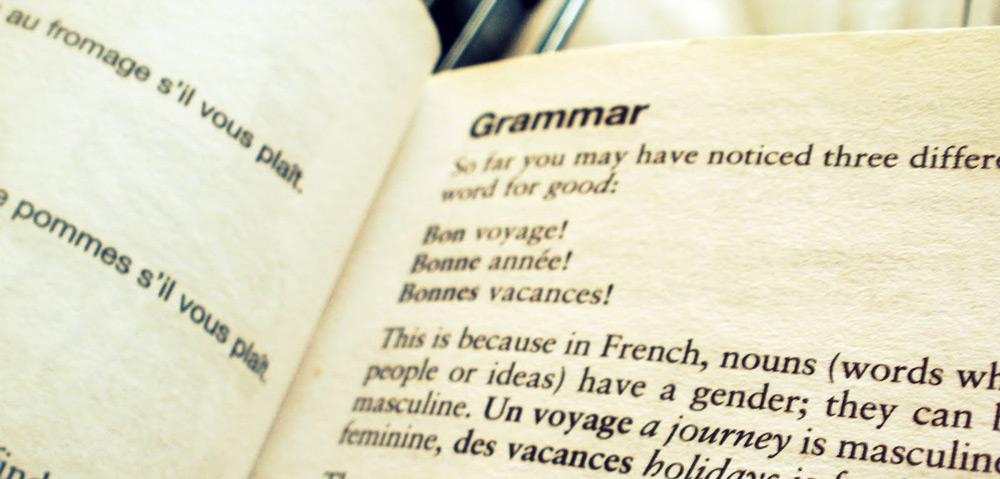- 31 octobre 2016
- Les exclus de Theatre in Paris
- Jessica Gilligan
Cultural and educational benefits of entertainment in its original language
Subtitles can be used as a veritable tool in the learning process..." Why do we travel? To relax, to have fun, to see new places... There are many motives, but Theatre in Paris would say that the number one reason we travel is to learn about another culture. Einstein said, "Intellectual growth should commence at birth and cease only at death." Much of a country's unique culture is translated through the art that they produce, be it paintings, books, films, or theatre plays. And at the heart of a community's culture is, of course, their language. So how much can we actually learn by enjoying foreign art, and more specifically, entertainment? Can watching a foreign film or play - with subtitles, of course - actually teach us something?
To get the scoop, we talked to French language professor and founder of French à la Carte Florence Harang and one of her students - separately, so they could say what they really felt!

Interview with French student Kasia Polkowska
"I believe that all kinds of social activities and regular exposure to French culture through art, books or movies is greatly improving our general understanding of this language." @kasia_polkowska
Theatre in Paris: For how long have you been studying French?
KP: 6 years in total. First couple of years at my university as an extra curriculum course, followed by an almost 10-year-break. I retook the study three years ago and have been continuing up to now.
TiP: What are your favourite tricks for picking up a new language?
KP: The one which works best for me is talking to native speakers: in the workplace, in shops and restaurants (providing I live in the country of the language). This way I force my brain to make use of grammar and vocabulary on the spot and can always relate to these real life situations later on. I also listen to songs and podcasts as well as watch movies in the language I study.
TiP: Do you ever watch French films with subtitles to help improve your French?
KP: Yes, I love to learn new words when watching movies. Un Americain à Paris, Intouchables, Qu'est-ce qu'on a fait au Bon Dieu? or Tokyo fiancée are the ones I always come back to.
TiP: What are the biggest difficulties you've faced while studying the French language?
KP: My biggest worry has always been French grammar. While I could easily learn tenses, conditions and vocabulary by relating them to other languages I know, the use of articles, pronouns and subjunctive is a hard nut to crack! I also find writing much harder than speaking.
TiP: In your opinion, is it important to engage in activities that will help improve your French outside of an academic environment?
KP: Definitely! I believe that all kinds of social activities and regular exposure to the French culture through the arts, books or movies are greatly improving our general understanding of this language.
TiP: What brought you to Paris? Why did you choose French à la Carte?
KP: I love getting to know new cultures, and living in a different country is a great way to experience it. Having finished my work in Belgium I decided it's time for a new adventure. I chose France because it's beautiful, has a rich culture and fantastic cuisine! Staying in the City of Lights was a natural choice.
I picked French à la Carte because I had the flexibility to create my study program together with the teacher before and during the course. I liked the idea of studying at my place and at the time that suited me. What also made me choose French àla Carte was the possibility to start this tailored course just a few days after my initial inquiry. I enjoyed these individual lessons and improved my language skills in no time!
TiP: Have you ever seen a French theatre play? If not, would you like to?
KP: Yes, I saw one theatre play already and hope to see more!

Interview with French teacher Florence Harang
"As you progress in a language little by little, a new horizon opens for you. Johann Goethe said, 'The soul of a people lives in its language.' This rings so true." @florence_harang
TiP: Your classes are very unique, and very geared towards tourism compared to other language schools in Paris, specifically your class for "Paris Lovers". What is your favourite aspect of your job?
FH: I use Paris as an extension of the classroom. It is a culturally rich city, what with its architecture, gastronomy, and history... Learning in a true setting can be very efficient for students, and also very pleasant. One can learn the "subjonctif" in class, but using vocabulary to appreciate art at the foot of a statue by Rodin is very motivational. Paris offers a multitude of places and activities that can be borrowed for an educational setting.
TiP: For a tourist in Paris for a week or two, would it be useful to learn a bit of French?
H: Firstly, on a practical level, yes of course, but it's also a sign of respect and a mark of openness. Even if a tourist in Paris hasn't "mastered" greetings in French, he or she should still use them, it will always be well-received. [...] As you progress in a language little by little, a new horizon opens for you. Johann Goethe said, "The soul of a people lives in its language." This rings so true.
TiP: Do you have any particular advice for those who hope to begin learning French?
FH: When one begins to learn French, the ideal way to learn would be to practice as quickly as possible with a native French speaker. [...] Face to face or even on Skype for a beginner is advantageous in that it becomes an exchange. [...] The theoretical knowledge is not enough. And it's no secret that memorisation comes with repetition!
TiP: Would you recommend seeing a play or a movie in French with subtitles in French to improve?
FH: In my opinion, this is the best approach, and by far the most efficient. On one hand you discover the cultural patrimony, and the language and culture are interconnected. From a linguistic point of view, films and plays reflect the actual spoken language, the contemporary language. In art, everyday French and slang ("argot") are alternated. Every aspect of the language is therefore represented. Dialogues are neither frozen nor artificial, as they often are in standard methods of education in French as a Second Language. Subtitles enable the audience and students to [really] memorise new expressions, new vocabulary, and new idioms. Subtitles can be used as a veritable tool in the learning process.
TiP: Could you describe the pedagogy behind the teaching process of a foreign language, especially French?
FH: Pedagogy in the education of French, or any language for that matter, is never fixed. Language is a living element, in permanent evolution, so its teaching process must also advance with the language. Today, we teach French more and more with the objective of immediate communication. Someone who studies French must be capable in a couple of hours to interact, even really simply, with a native. [...] We are more and more pragmatic, and flexible: every student has his or her particular background, native country, aptitudes, objectives... Education follows and adapts to this criteria. We do not teach a 25-year-old multilingual student as we would a 50-year-old monolingual student.
TiP: What would you say are the biggest challenges your students have?
FH: [Some students find it a challenge] to remain motivated, [...] to persevere,[...] and to spend time memorising. [Others have difficulty in] choosing the right type of programme for them: online, in class, private, in a group setting, etc. One should make an informed selection among the best applications which flourish each day on the internet so as not to drift and become scattered amid the multitude of good and less good resources which exist online. Choose one or two, and not fifteen. [One must] especially find pleasure in learning. Scientific studies prove that pleasure sparks efficient learning!

Harang and Polkowska are not the only ones who believe in the efficiency of foreign films, plays, and subtitles for educational purposes. Martine Danal says that subtitling can increase language comprehension and leads to additional cognitive benefits, such as greater depth of processing, and Isabel Borris and Robert Lafayette found in a study of French students that "developing learners taste for subtitles would increase learners interest in maintaining and/or increasing their knowledge of the foreign language outside the academic setting." It would seem that the vote is unanimous and that the best way to learn about a new culture, and its language, is to be fully immersed in it, be it for a year and a half, or an hour and a half. As Ben Franklin once said,
"Tell me and I forget, teach me and I may remember, involve me, and I learn."





